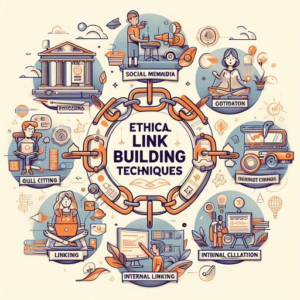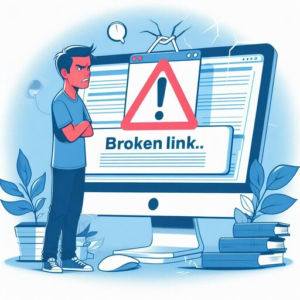In the expansive landscape of the internet, where websites compete for attention and visibility, gaining a deep understanding of search engine optimization (SEO) becomes crucial. Among the pivotal elements in the SEO realm is the notion of inbound links.
Within this article, we will explore the definition of inbound links, their importance in enhancing your website’s ranking, and the fundamental strategies to effectively harness their potential.
Inbound links, often referred to as backlinks or incoming links, are hyperlinks originating from external sources that direct users to your website. They play a pivotal role in SEO, acting as virtual endorsements for your content.

When reputable websites link to your pages, search engines interpret this as a vote of confidence, signaling that your site is credible and relevant. The accumulation of such endorsements contributes to an increased perception of authority, subsequently impacting your website’s ranking in search engine results.
Understanding the significance of inbound links involves recognizing their role in establishing your website’s credibility and authority within the digital ecosystem.
The more high-quality links your site accumulates, the more likely search engines are to view it as a reliable source of information, leading to improved search rankings.
Effectively harnessing the potential of inbound links requires strategic planning. Link relevance is paramount; ensure that links come from websites closely aligned with your content to enhance their contextual value.
Anchor text optimization involves incorporating relevant keywords into the clickable part of the hyperlink, providing both search engines and users with context about the linked content.
Diversifying your links by obtaining them from various sources, such as social media platforms, industry directories, and guest posts, contributes to a well-rounded link profile, further boosting your website’s credibility.
Unveiling the Mystery: What are Inbound Links?
Inbound links, alternatively referred to as backlinks or incoming links, are essentially hyperlinks directing users to your website from external sources.
Picture them as digital endorsements – when another website links to your content, search engines interpret it as a vote of confidence. The credibility and relevance of your site receive a boost as more reputable websites vouch for your content.
This digital referencing system acts as a signal to search engines that your website is a reliable and valuable source of information.
As the number of quality inbound links increases, so does the confidence search engines place in your website, potentially leading to improved rankings in search results.
In essence, inbound links serve as a virtual approval system, affirming the credibility and significance of your content in the vast digital landscape.
The SEO Connection: Why Inbound Links Matter
Search engines, including the sophisticated algorithms of Google, utilize intricate methods to assess a website’s relevance and authority. In this multifaceted evaluation process, inbound links emerge as pivotal factors.
They serve as indicators to search engines, signifying the credibility and significance of a website within the vast landscape of SEO.

The more quality inbound links a site accumulates, the more positively it is perceived, ultimately influencing its ranking in search engine results.
1. Authority and Trustworthiness
Search engines view inbound links as validations of your website’s credibility. If authoritative and trustworthy websites link to your content, it signals to search engines that your information is reliable. This can result in an improved domain authority for your site, a key factor in search engine ranking.
2. Improved Ranking
Inbound links act as pathways for search engines to discover and index your content. The more quality links your website has, the higher its chances of ranking well in search engine results pages (SERPs). It’s like building a virtual bridge that connects your content to the vast landscape of the internet.
3. Relevance and Context
Not all links are created equal. Relevance is crucial. When links come from websites with content similar to yours, it adds contextual value. Search engines prioritize links that seamlessly fit into the overall topic or theme of your site. This relevance contributes significantly to SEO success.
The Building Blocks of Inbound Link Success
Now that we understand the importance of inbound links, let’s explore some strategies to make the most of this powerful SEO tool:

1. Link Relevance
Quality triumphs over quantity. Ensure that the websites linking to yours are relevant to your content. If your website is about fitness, a link from a reputable fitness blog holds more weight than one from a cooking site. Aim for links that naturally align with your niche.
2. Anchor Text Optimization
The anchor text, the clickable part of a hyperlink, is a crucial element. Optimize it with relevant keywords that describe the linked content. This not only provides context to search engines but also enhances the user experience by offering a preview of what the linked page contains.
3. Diversify Your Links
Variety is the spice of life, and the same holds true for inbound links. Aim for a diverse link profile that includes links from various sources. This could include social media platforms, industry directories, guest posts, and more. A well-rounded link profile adds depth to your website’s credibility.
4. Natural Link Building
Steer clear of the pitfalls associated with buying links or participating in link schemes. Search engines possess the ability to discern artificial link-building tactics and may penalize your website accordingly. Instead, channel your efforts into crafting high-quality, shareable content that naturally draws links from reputable sources. By focusing on organic and authentic link acquisition, you not only abide by ethical practices but also safeguard your website against potential penalties, fostering a sustainable and reputable online presence.
Inbound Links: A Roadmap to SEO Success
In conclusion, inbound links serve as a navigational guide through the intricate landscape of SEO. Understanding their significance and implementing effective strategies can propel your website to new heights in search engine rankings.
As you embark on your SEO journey, remember the importance of relevance, anchor text optimization, and link diversity.
By cultivating a network of inbound links from reputable sources, you not only enhance your website’s visibility but also establish it as a credible and authoritative voice in your niche.
So, take the time to build those virtual bridges, and watch as your website climbs the ranks in the digital realm. Happy linking!
Related Reading: If you’re interested in mastering guest blogging strategies, check out this insightful guide. It provides valuable tips for effective digital marketing guest posts and offers a comprehensive list of free guest posting sites for 2023–2024. For more on link building and its importance, explore SEO Mastery: Guest Posting and Niche Edits.






